The 40 Best Games of 2024
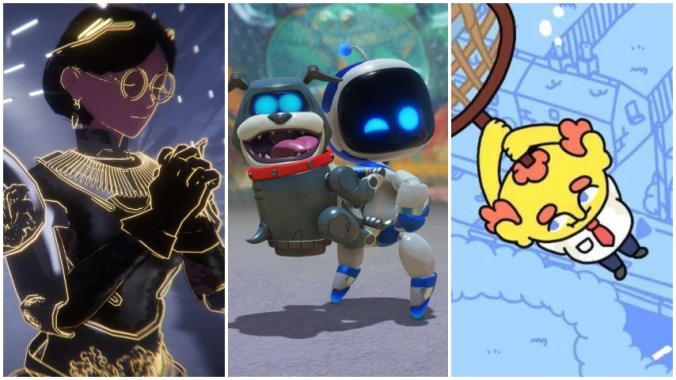
2024 gave us some great games. This list’s top 10 is as good as any I’ve seen in my 14 (?!) years running this section at Paste. But the industry is at a major crossroads right now, stuck between a dying era of ever-escalating size and scope and whatever comes next, and that’s reflected by what kind of games made a splash this year. The fact that no huge budget “AAA” game by a Western studio with hundreds of (always crunched, always on the verge of being laid off) employees resonated with audiences or critics in 2024 shows how creatively bankrupt the dominant sector of the games world is today. Releasing good art through a corporation is always exceedingly difficult but for games it’s as impossible as it’s ever been (outside of Japanese companies, who are given more freedom to balance art and commerce than their Western counterparts); rampant layoffs, studio closures, and consolidation have wiped out a notable chunk of the industry’s creative class, and what remains is too risk-averse and commercially desperate to make anything genuinely interesting or challenging. The only “major label” games worth celebrating this year that weren’t developed in Japan were smaller titles sent out to die by massive publishers who have no idea what they’re doing, an explicit critique of the corporatism that brought the industry to this place, and an old-fashioned-ish Bioware RPG that barely made our list.
If there is an upside to the current system’s steady unraveling, it’s that it’s brought greater attention to the smaller publishers and developers who are actually making good, interesting games. The fact that Balatro, a game made by one single developer, was perhaps the most praised and consistently buzzed about game of the year, and continues to get hyped 10 months after release, is a promising sign—like a small flower blooming through a cement crack at the end of a movie about the apocalypse. Yes, designers take a lot of risk striking out on their own, without the money and security of a corporate game design job (a security that only lasts until the next acquisition or round of layoffs, of course), but any game made with passion and personality has more potential to become great than the latest product churned out by the corporate assembly lines. And more than any other recent year, this one has been proof. Here are the best games of 2024, as picked by a small team of Paste games writers, including assistant editor Elijah Gonzalez, contributors Dia Lacina and Marc Normandin, and me. No DLC or Early Access games were considered, so please save your questions about Shadow of the Erdtree and Hades II.—Garrett Martin
40. Like a Dragon: Infinite Wealth
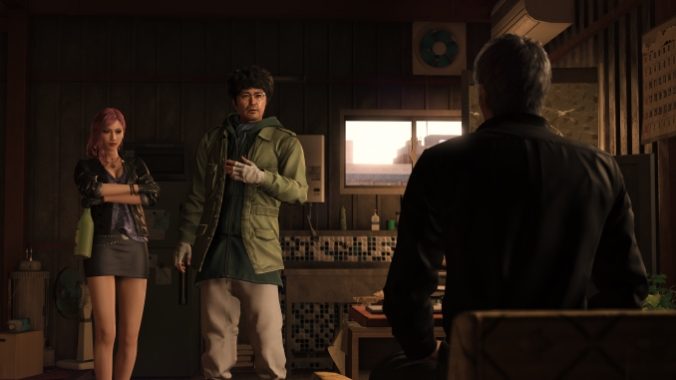
Platforms: PlayStation 5, Xbox Series X|S, PC, PlayStation 4, Xbox One
Ryu Ga Gotoku Studio continues to defy the inertia of the modern videogame industry by putting out Like a Dragon games at such a rapid clip that they’ve released like 10 of these since the last Grand Theft Auto came out. That achievement feels doubly impressive considering the scale of their most recent outing, Like a Dragon: Infinite Wealth; it contains a full-blown Pokémon-spoofing minigame, a resort simulator, dozens of oddball side missions, and tons of other distractions. And while some of these accouterments can be a tad excessive at times, most of these optional additions are quite fun and go nicely with this experience’s leisurely turn-based RPG pacing. Perhaps most importantly, though, Infinite Wealth’s central cast of characters and their endearing relationships bring it all together, resulting in the heartfelt exchanges and bursts of absurdity the series is known for. Sure, the overarching plot is as convoluted as ever and doesn’t entirely coalesce, but with its latest installment, these games continue to be some of the most earnest cultural objects in existence, and that’s certainly worth something.—Elijah Gonzalez
39. Dragon Age: The Veilguard
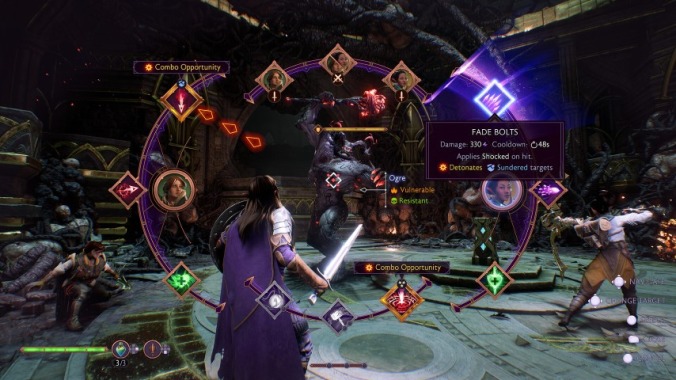
Platforms: PlayStation 5, Xbox Series X|S, PC
Dragon Age: The Veilguard is far from perfect; combat is repetitive, the world leans on stock fantasy concepts more than it should, and it’s a little too bloated. I only started playing it to get some background before my interview with its creative director; I never would’ve thought I’d stick with it after that interview, and keep playing it for another 50 hours or so. Part of it might be because it’s been so long since I’ve played a classic Bioware-style game that I liked, and the fundamental appeal of making friends to stop the end of the world remains strong. But it also says a lot about Veilguard and especially its writing and characters; unlike Origins or Dragon Age II, I genuinely like talking to these people, learning about their struggles and hopes, and helping them become the best versions of themselves. There’s not a single drip among Veilguard’s seven companions; sure, they can all be annoying in different ways, like most people, but they all have redeeming qualities and I haven’t yet wished I could kill any of them permanently (something I can’t say about the buddies from older Dragon Age games). And as always there’s a primal allure to making my characters’ stats go up, and rampaging through the same fights and enemies hasn’t become too obnoxious yet. I actually kind of appreciate that kind of mindless grind, as somebody who grew up back when every RPG was like that.—Garrett Martin
38. Kill Knight
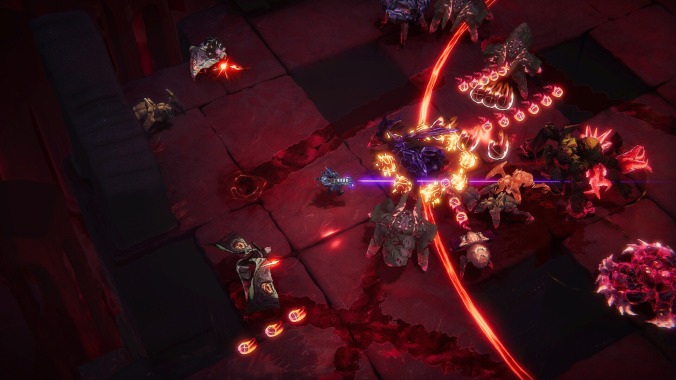
Platforms: PC, PlayStation 5, Xbox Series X|S, Switch, PlayStation 4, Xbox One
Kill Knight will make your eyes bleed, and I mean that as a compliment. You play as a banished knight doomed to fight wave after wave of creeping monsters in the Abyss, all in order to find the Last Angel and slay them. Basically, it’s a metal album cover in ludic form where you shoot and slash via arcade-style twin-stick gameplay that heavily borrows from DOOM (2016). The core loop is all about brutalizing demons while managing resources to ensure maximum-efficiency bloodletting; you need to kill with your sword to get ammo for your heavy-hitting weapons, absorb blood crystals to charge your special attack, and use said special attack to recover health. It sounds simple enough, but when the screen is filled with laser beams, saw blades, and insects from the ninth layer of hell, it can be a little tricky to keep everything straight. While each of these five levels is unforgiving and fast-paced, thankfully, the controls are silky smooth, mostly giving you the tools to overcome these torments while carving out a killer high score. While I haven’t gotten through all these arenas yet, at its best, I’ve found myself completely engrossed in white-knuckled leaderboard chasing as I tried to maintain my combo and composure.
If I have a main complaint, though, it’s that some of these levels feel less thoughtfully designed than others (I hate the third one!) because they can be filled with traps that are hard to parse amidst the screen full of guys who really, really want to kill you. Another grating detail is that to unlock new weapons and armor, you’re encouraged to complete arbitrary optional objectives that mostly feel like a chore (you can also buy these via an in-game currency, but this takes forever). Basically, getting at least some of these extra weapons seems pretty important for competing on the leaderboard, but doing so can feel like a grind, and I honestly would have preferred it if all the stages and items had just been unlocked from the jump to make it easier to get to the good part. Still, while it can be a tad frustrating in some ways, Kill Knight is a must-play for high-score chasers who want to test their reflexes or see alarming amounts of lo-fi carnage.—Elijah Gonzalez
37. Interstate 35
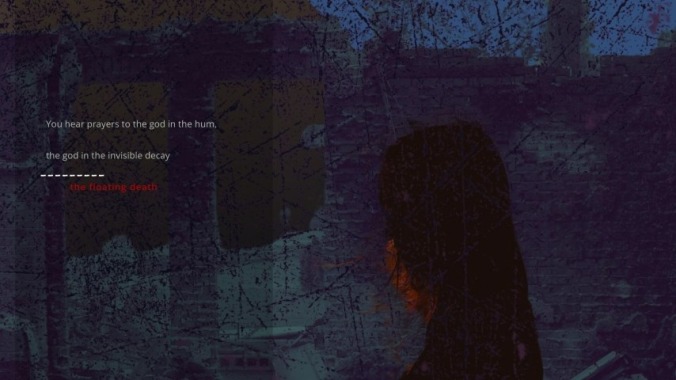
Platform: PC
When Jesus talks in the Bible his words are red. The words you click on in the new visual novel Interstate 35 are also red. Set deep in the Bible Belt, near a post-apocalyptic Dallas scraping by after getting hit by a stray nuke, Interstate 35 elevates your choices to the words of our lord and savior (well, somebody’s lord and savior), with clickable chains of red letters stabbing through paragraphs of white serving as the bridge to the next passage, the next turn of the tale. It underscores both the existential scope of this story as well as the pointlessness of religion after a nuclear holocaust; as one character asks early on, “I’m just wondering when we’ll realize we’re living through an epilogue,” and what are Heaven and Hell to believers but epilogues? There’s no better time to be your own personal Jesus than after the bomb drops. The debut game from Radiant Array (whose writer, Julie Muncy, is a longtime games critic and journalist from Austin and a friend of Paste’s games section) explores the power and transience of memory within a time of industrial scale loss, with Texas and its all-encompassing Texasness rooting the story in a very real, very weird, very recognizable place. Like recent faves Norco and Kentucky Route Zero, Interstate 35 plumbs an almost mystical south for both an uncomfortable weirdness and a stark evocation of the sadness and degradation inherent to modern life, from the viewpoint of a local who knows the score and is better suited to interrogate it than any outsider ever could.—Garrett Martin
36. Final Fantasy VII Rebirth
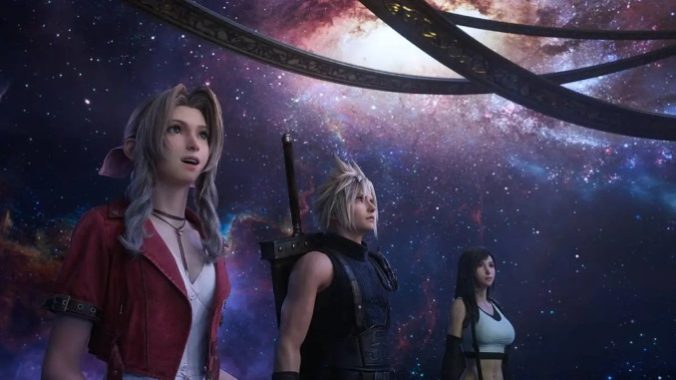
Platform: PlayStation 5
Final Fantasy VII Rebirth is most successful when it’s playing the hits. I cannot understate the shit-eating grin I bore on my face time and time again as I revisited places and characters that I’ve grown to love over the years. Costa Del Sol’s whole deal is fan service of the highest degree, for example, but upon some reflection, it’s hard to pinpoint a part of the game that isn’t. After all, VII‘s shadow is long and immense, and why cast light on it when you can draw it out even more? And so Rebirth keeps much of the original’s weirdo second act intact, from the march in Junon to the offputting and bizarre dolphin minigame just below it. Rebirth opts for accentuating Final Fantasy VII‘s eccentricities rather than casting them off or rebuilding them in many of these instances, and by god do I love it for that. Especially coming off of the constant escalation and movement of Final Fantasy XIV‘s 10-year story that I’m still working through, as well as the overly serious and misguided attempts of Final Fantasy XVI, Rebirth‘s unadulterated spirit is a breath of fresh, untainted-by-Mako-poisoning air. It’s a game whose playfulness never fails to rear its head, whether it be in some ludicrous plot advancement, a side quest where you are forced to fight as a frog, or partaking in any one of Rebirth‘s many, many minigames.—Moises Taveras
35. Utopia Must Fall
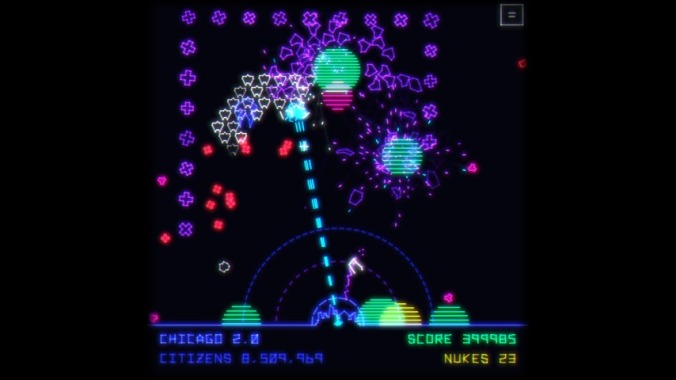
Platform: PC
The best retro games don’t merely regurgitate something that was done better 40 years ago. The devs at Pixeljam understand this; their game Utopia Must Fall is immediately recognizable as a tribute to the early ’80s, but instead of riffing on a single old arcade game it mashes together some of the best to ever do it. It borrows the fortress defense core of Missile Command, the dual-joystick shooting of Robotron 2084, the threatening spaceships of Space Invaders and Galaga, the sleek visual style of vector scan games, and the fragmenting asteroids of, uh, Asteroids to build something new and exciting. You’ll use the two sticks on your PC controller (I’m playing on Steam Deck) to aim and fire a high-speed cannon at the alien invaders trying to conquer your city; a shield helps protect your buildings at first, and a limited stash of nukes can be used to take out big groups or major enemies deeper in space. Aliens only attack for a set period each day, and between waves you can pick from a number of upgrades to your weapons and shield, increase your nuke production, develop new weapons, or even try to reach out to the aliens to make piece. (Maybe don’t pick that last option too much…) Like any self-respecting arcade classic, the difficulty of Utopia Must Fall ramps up quickly from wave to wave, and you’ll need to be more than just a quick shot to survive. You’ll have to choose your updates wisely, master the increasingly complex patterns of enemies that come your way, and also just hope for a little bit of luck. Utopia Must Fall is yet one more example of an excellent new game using four decades of hindsight and advancements in game design to fabricate something startling out of the most basic and familiar building blocks of videogames. I can’t recommend it enough.—Garrett Martin
34. I Am Your Beast
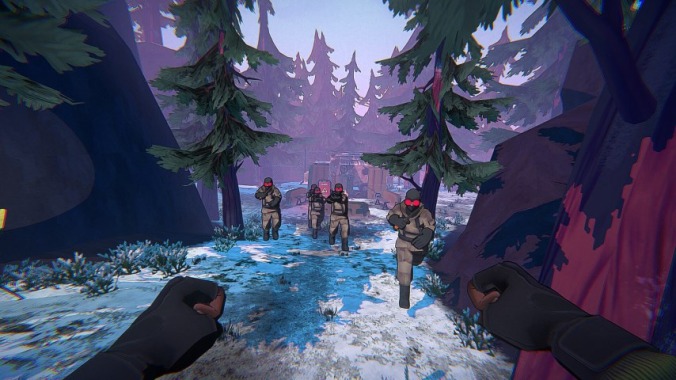
Platform: PC
I don’t know if there’s ever a good reason to kill somebody, much less endless waves of somebodies, but I Am Your Beast has maybe presented us with one. In this lightning-fast spree-shooter from Strange Scaffold (aka Xalavier Nelson Jr., the prolific designer behind games like Hypnospace Outlaw, Clickholding, and El Paso, Elsewhere, as well as bespoke arcade games for the arts collective Meow Wolf) you play as a former pro soldier molded into an almost superhuman killing machine by the government. You’re supposed to be out, hard stop, and have retired to a large, rambling plot of untamed nature where you aim to escape from the world you’ve spent a lifetime slaughtering your way through. Uncle Sam has other ideas, though, and tries to force you back into service at the business end of a machine gun; if you don’t say yes the only other answer is your own death. The only thing you can do in that situation, of course, is kill as many of these soldiers as possible as quickly as possible, trying to accomplish the destructive goals of each level in the allotted time. I Am Your Beast doesn’t give you time to prepare or scope out the map of each mission; it’s go-go-go from the jump as you sprint through these wooded hills, trying to meet specific goals on each level before escaping through the underground tunnel system you built and whose layout is known only by you. On some levels you’ll have to kill every enemy; on others you’ll have to disrupt their satellite communications or collect a certain number of intel reports. No matter the mission you’ll be tearing ass as fast as you can while dodging bullets and bombs and laying waste to the goons trying to ruin your peace and quiet. The whole game is built for speed, and the faster you finish a level the better you’ll be rewarded. The non-stop rush can be dizzying in an exciting way, and the design of each map fits its specific goal like a hand in a glove. As riveting as its action can be, I Am Your Beast’s greatest strength is unsurprisingly its writing and voice-acting; Strange Scaffold’s games are tremendous at both, and that remains the case here, with an incisive story about how militaries dehumanize their soldiers and have no use or respect for them outside of their job. Nelson’s one of the best we’ve got, and I Am Your Beast is just more proof. It’s one of the best games of 2024.—Garrett Martin
33. Rivals of Aether II
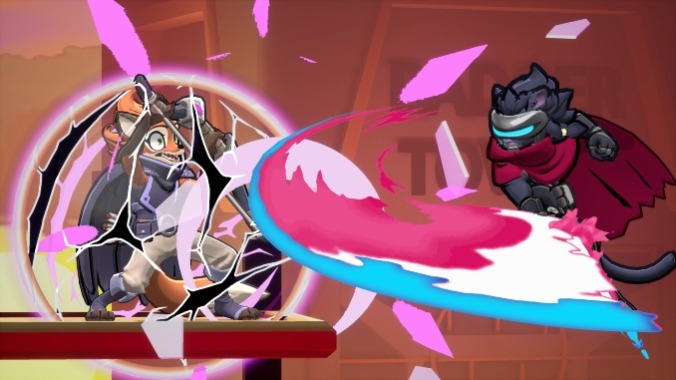
Platform: PC
Rivals of Aether II catches lightning in a bottle. It not only mimics but also builds on one of the best competitive games ever made, emulating its expressive battles so fast they make eyeballs bleed and finger joints explode. The cast is varied, the combos are dynamic, and the core movement is electric. Like with any fighting game, I’m sure there will be some competitive hiccups (some are already unhappy with how strong crouch canceling is), but what we have here is a rewarding platform fighter that controls like a dream—I wish that it did more to on-board new players, and was less limited outside of multiplayer, but for genre veterans, this core feel is the most important piece. While it’s way too early to tell if the game will fully capture Melee’s magic, it’s come closer than I thought possible, and that’s no small feat.—Elijah Gonzalez
32. Kunitsu-Gami: Path of the Goddess
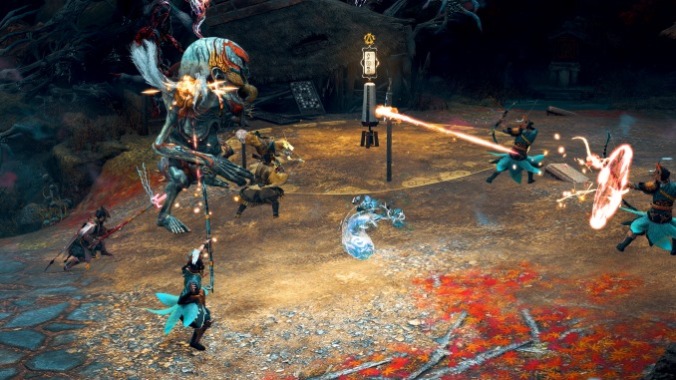
Platforms: PC, PlayStation 5, Xbox Series X|S, Switch, PlayStation 4, Xbox One
Dance-mad strategy game Kunitsu-Gami is a grower. I couldn’t stop thinking about it after my positive-but-cool review back in July, and even went back and started it up again a month or two later, which I almost never have time to do. It’s fundamentally out of step with the industry and its trends today, and totally confident in that unique vision, which is the kind of fire that forges cult favorites. It was not a hit, but it found its people, and those people love it, for good reason: it mashes up tower defense strategy with the satisfying scratch of the village sim, and then steeps it all in a bewitching portrayal of Japanese folklore. It might have fallen off the radar for most people, but Kunitsu-Gami is a path worth taking, and one of the best games of 2024.—Garrett Martin
31. Children of the Sun
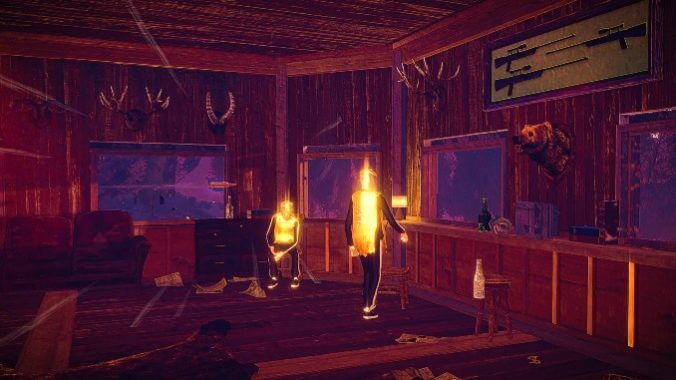
Platform: PC
There’s a lot to take in with Children of the Sun, a solo dev project from René Rother and publisher Devolver Digital, but the first thing that jumps out are its feverish bad vibes. Surrounded by a purple haze, The Girl takes aim at an unsuspecting cultist and fires her only bullet. Propelled by more than gunpowder, it finds its mark, sweeping the target off their feet as a cartoonish geyser of gore erupts from their skull. However, this projectile hasn’t reached its final destination. The other victims watch in horror as the round emerges from their dead compatriot, leapfrogging across the battlefield and into brains until there’s no one left standing beside the shooter, whose glaring green eyes and serial killer mask imply this isn’t the last hunt.
Children of the Sun’s explosions of violence pull us into The Girl’s quest for revenge, combining dome-blasting fun with action-puzzles that invite creativity. Equally important, the game’s aesthetic rips—its offputting art style, color choices, and unsavory elements, like the bliss The Girl takes from drilling holes in cultist skulls, driving home all the visceral details. While I wish this attention-grabbing EP had a few more tracks, what’s here lands with the impact of a hollow-point round.—Elijah Gonzalez
30. S.T.A.L.K.E.R. 2: Heart of Chornobyl
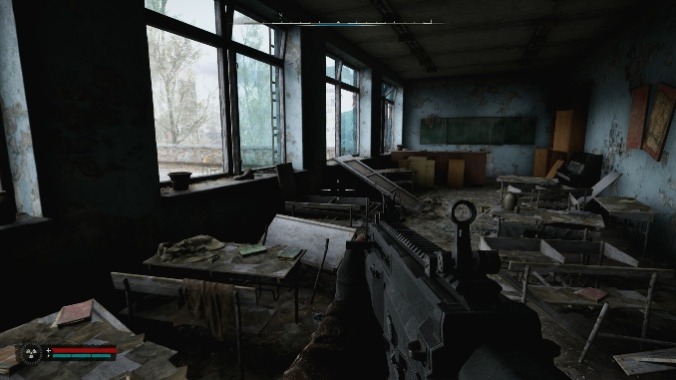
Platforms: Xbox Series X|S, PC
The act of playing S.T.A.L.K.E.R. 2 is one of low-grade sadomasochism. For the right kind of person, it’s immensely satisfying, but that satisfaction comes at a cost. This is a tense, unnerving, and brutal game even when you’ve kicked the difficulty down to Story Mode. It maybe could use a second pass of balancing. Or you could just learn to run fast.
The instant I left homebase, my posture changed. Despite it being just a videogame, I could feel my breathing and heart rate shift. My muscles tensed, and I bit down on my molars and had to repeatedly stop myself from grinding them. It’s hard to find a spot in The Zone that isn’t beautiful in some way. It’s impossible to find a spot out on an excursion that’s remotely safe. Danger is everywhere. Everything is a hard-won slog. It’s quite possible that I actually hate playing S.T.A.L.K.E.R. 2, that the true faithful are built different. I’m willing to accept that.
But that’s because if I had to distill it down, this is a game about being miserable in an irradiated and seemingly cursed field in Ukraine with no real end in sight. In that regard, the game is a runaway success. I only know peace at the campfire or makeshift bar. I am miserable going on missions. Every time I peek through a door, I feel my breath catch and seize in my lungs. Seeing movement on the edge of a hillside or distant rooftop makes my hands cramp up instinctively from not knowing if I’m going to be in a tense, 20-minute-long firefight. The heartbeat sound effect feels like an out-of-control ear infection and makes my head hurt like one. And for what? Most of my time is spent rummaging through trash for irradiated cans of whatever or vodka to cure the radiation I am absorbing while looking for something that isn’t vodka. I can feel the lactic acid pooling in my muscles just thinking about it. This is raw survivalism in a Gerd Ludwig nightmare. And yet, everyone dies in The Zone eventually.—Dia Lacina
29. Unicorn Overlord
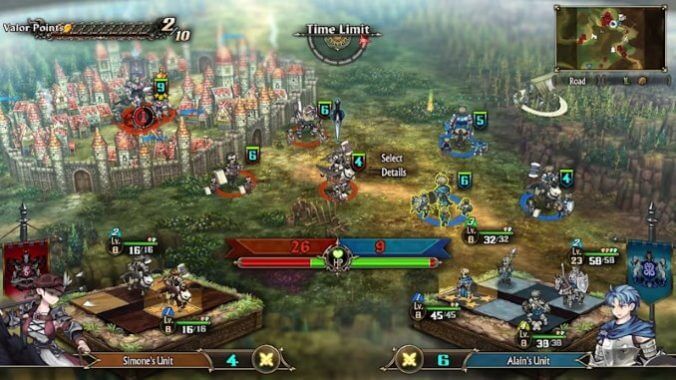
Platforms: Switch, PlayStation 5, Xbox Series X|S, PlayStation 4
This is more or less the story of Unicorn Overlord: Its art is beautiful, its battle system is fun, and it has the best gameplay loop of maybe any SRPG I’ve ever played, reminiscent of old Fire Emblem if it were built with modern conveniences. It’s a pretty wrapper for a bad story, but that story is at least unobtrusive enough that it neither adds nor takes away from the gameplay. Building towns and promoting units gave me an unmatched feeling of satisfaction, and when I got to see my improvements play out against an especially tough battle, it felt great. I did find myself dragging my feet at about the 30 hour mark, when I was close enough to the end to have made most of the improvements to my army that I could, but no longer pulled through by the momentum of the story. What made me push through wasn’t just how fun the action is, but the small things: the design of new items in the shop, the new towns to save, and the fun of remixing my units to see if they could win in new ways.—Emily Price
28. Tactical Breach Wizards
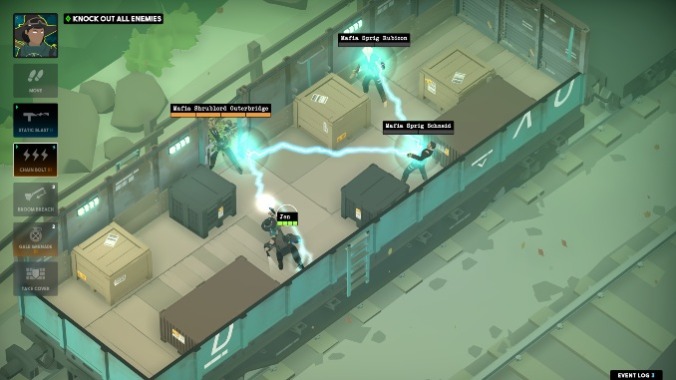
Platform: PC
At first blush, Tactical Breach Wizards seems to be playing the turn-based tactics sub-genre straight; it’s turn-based, you command a squad who move across a grid-based tile, it’s presented from an isometric perspective. But where the game differs is that instead of being stuffed to the brim with procedurally generated challenges and other uncertainties, it mimics the deterministic logic of something like Into the Breach, successfully emphasizing the latent puzzler elements found in tactics titles as its witty dialogue and satisfying storytelling round out this clean operation. Ultimately its’ combo-heavy battles and well-considered storytelling come together with precision. While I wish it was a tad more punishing, I still had a blast orchestrating complicated turns that involved teleporting allies across the map, utilizing diverse powers, and, of course, knocking hapless cronies out windows. But, perhaps its greatest accomplishment is how it escapes the inertia of countless other modern war games that feel like the product of the military-industrial complex. I guess all it took to avoid these tropes was not being in the back pocket of the US armed forces, a bit of empathy, and a guy who looks like Gandalf with a magic-infused M16. Who knew?—Elijah Gonzalez
27. Shogun Showdown
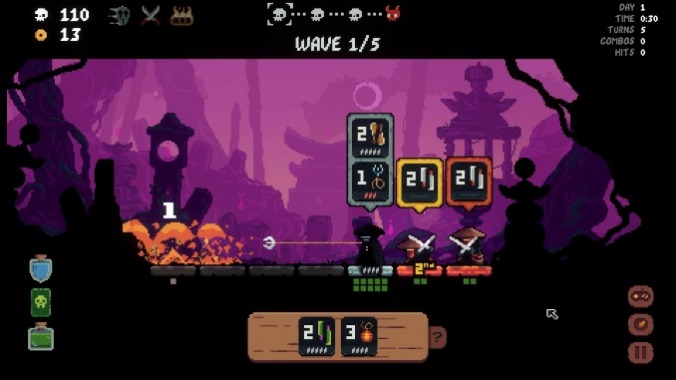
Platforms: PC, PlayStation 5, Xbox Series X|S, Switch, PlayStation 4, Xbox One
Listen, I get the complaints, especially for folks with no interest in cards; roguelike deckbuilders have rapidly become a hot genre, sometimes to the point where it feels like every other game made by a smaller team checks these same boxes. But while there are a lot of them, a significant chunk of these find their own fascinating niches, which not only helps distinguish them among genre-diehards but also helps newcomers wrap their heads around a style of experience they may not get the appeal of. By removing the traditional concept of a deck while retaining complexity and tough choices, Shogun Showdown threatens to suck in a whole new cohort until they’re haggling at their local boardgame shop for the Planeswalker that will tie their deck together (ok, maybe they won’t go that far, but still). There may be a lot of games about cards these days, but as long as we continue to get ones that shuffle things up in bold and compelling ways, I’m not worried about getting sick of the genre any time soon.—Elijah Gonzalez
26. Crow Country
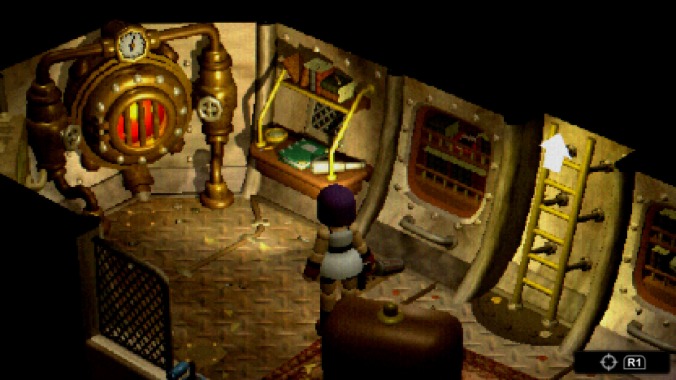
Platforms: PC, PlayStation 5, Xbox Series X|S, Switch, PlayStation 4
Set in 1990 in an abandoned theme park in Paste‘s home town of Atlanta, Ga., Crow Country wears its OG PlayStation influences on the sleeves of its Charlotte Hornets Starter jacket. On the surface it ticks off all the classic survival horror boxes: limited ammo and health, an awkward aiming system, incentivizing head shots (or even just running) over any other attacks, and a claustrophobic atmosphere full of dread and jump scares. I generally hate survival horror, so I’m glad to report there’s so much more to Crow Country beyond those genre trappings. It’s really more about puzzles than action, almost like a Sierra point-and-click with a three-quarters view and the occasional need to shoot something. You explore the park’s various themed areas, looking for clues to a bewitching central mystery about the park’s creation and abrupt closure. The writing is compelling throughout, both creepy and funny, and its small cast of characters are concisely sketched with lifelike depth. It’s an engrossing enigma that’s clever from start to finish, and with buckets of retro warmth and charm. Plus it mentions the Atlanta Falcons. Obviously I’m going to dig it.—Garrett Martin
25. Little Kitty, Big City
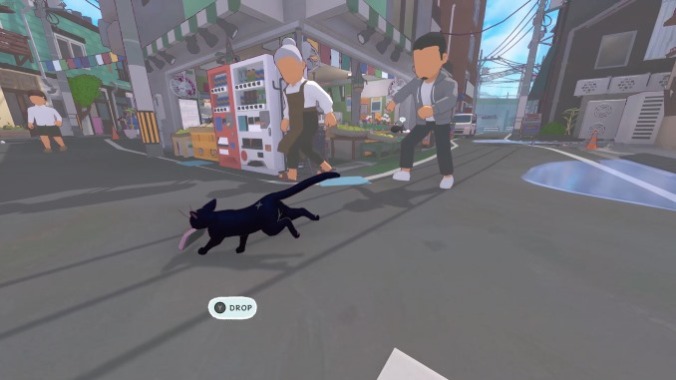
Platforms: PC, Switch, Xbox Series X|S, Xbox One
“Hang out games”—games without urgency, that explicitly try not to stress you out too much—cozy games, as many call them—can be tough to get right. They can feel too much like busy work, with a checklist of stuff it wants you to do every day (hey, Animal Crossing!) It’s also not easy to build a world players want to hang out in. You have to be really good at writing stories, creating characters, and putting them in an environment that, if not warm and inviting, is at least compelling enough to keep players checking in. That’s the greatest strength of Little Kitty, Big City. I love this little kitten. I love how it slinks, stalks, crawls, and runs through the city. I’ve tripped probably 100 very serious business people on their way to work and it’s never gotten old. I love all these characters—the brave ducklings who roamed the city for show and tell, the sleepy bodega cat who proclaims himself the mayor, the shiba inus who go out of their mind barking at the kitty unless you give them a bone, which they’ll manically gnaw and slobber on for the rest of the game. Charm coats this game like hair and dander on a cat lover’s couch. With Little Kitty, Big City, Double Dagger has given us an ideal “hang out” game that helps so much to alleviate stress and sadness that it might also be the first “hang in there” game.—Garrett Martin
24. Ys X: Nordics
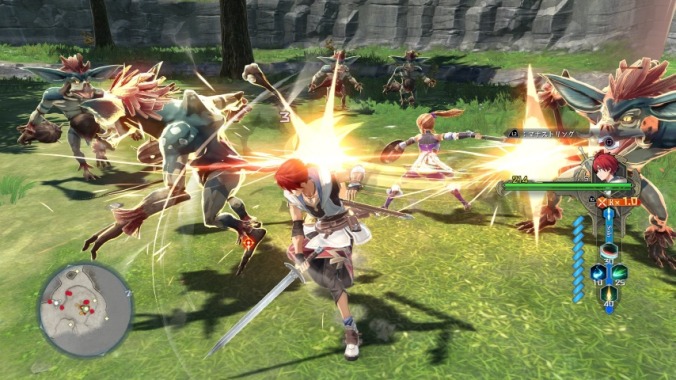
Platforms: PC, Switch, PlayStation 5, PlayStation 4
Putting Adol Christin on a boat for most of the runtime of a game seemed like a bad idea, considering his lengthy history of accidents at sea, but maybe Ys X being set before most of those incidents occurred saved him from that fate. Adol proved seaworthy, at least here, and Ys X managed to not only change up the setting by having so much of it occur on the water, but the fighting, as well. Ys X’s combat might seem a little slower at first, since it involves more blocking and evading than usual, but don’t confuse this for a Souls-like: once you start learning some skills, you’ll be using those instead of standard attacks for the most part, and basically never stop moving or attacking outside of the occasional block or evade.
This change gives Ys X an energy that Ys IX could never quite capture in its battles, and the tag-team setup that replaced the party format allows you to focus on building these massive, damage-multiplying skill chains that keeps battles moving no matter how many of them you fight. And, unlike with Ys IX, the pacing is tremendous: you can complete the whole game in a couple dozen hours if you want, but if you’d prefer to go 40-plus or beyond, there’s enough Ys and enjoyment for that, as well. It’s one of the greatest Ys games going, which is saying something.—Marc Normandin
23. Helldivers 2
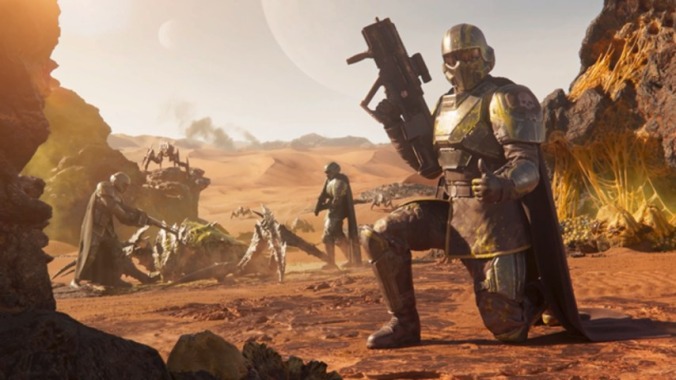
Platforms: PlayStation 5, PC
Helldivers 2 has had a bit of an up-and-down journey this year: it was an unexpected breakout hit, then drew ire for its temporary PSN linking policy and balancing decisions, until finally mostly ending up back in players’ good graces after a few extensive patches. The result is that this exercise in interstellar jingoism is more engaging than ever, with a huge arsenal of stratagems and ordinance that will almost inevitably accidentally turn your allies into mincemeat. This increased range of viable options results in much more varied “liberating,” with tons of tools that can be the right one for the current job. Although this increasingly empowering game balance squares awkwardly with all its glib anti-fascist satire, Helldivers 2 remains a brutal co-op shooter that demands teamwork if you want to avoid completely biting it. Well, that will probably happen even if you’re all well-coordinated veterans (again, that’s sort of the point considering the Starship Troopers inspiration), but that steep challenge makes for an oddly satisfying experience that will keep you and your friends marching toward certain doom.—Elijah Gonzalez
22. The Legend of Zelda: Echoes of Wisdom
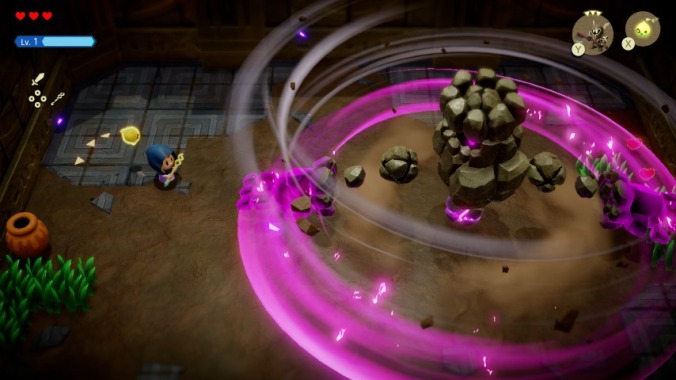
Platform: Switch
It’s been long overdue for Zelda to take center stage (or retake it if you count the maligned CD-i games), and thankfully The Legend of Zelda: Echoes of Wisdom makes for a worthwhile debut. With Link out of the picture, it’s up to Zelda to save Hyrule from encroaching calamity, and her main means of doing so is a magical staff that lets her clone objects and creatures. While Echoes of Wisdom may be structurally similar to other top-down Zelda games, the moment-to-moment gameplay takes a cue from Tears of the Kingdom’s playbook, involving more engineering and puzzling than sword slashing. Here, the core loop of summoning entities to solve puzzles and battles leads to many novel scenarios: use chairs and beds to create a structure that clears a chasm, deploy a spiky minion to repel a charging foe, or repurpose an exploding monster as a makeshift bomb. Although the UI eventually becomes a chore to navigate, and it loses steam in its back half, it’s pretty cool that Nintendo made a game where finding a particularly useful inanimate object, like a trampoline or a tile that floats for a few seconds, feels as consequential as unearthing the Master Sword. More weird follow-ups like this, please.—Elijah Gonzalez
21. Clickolding
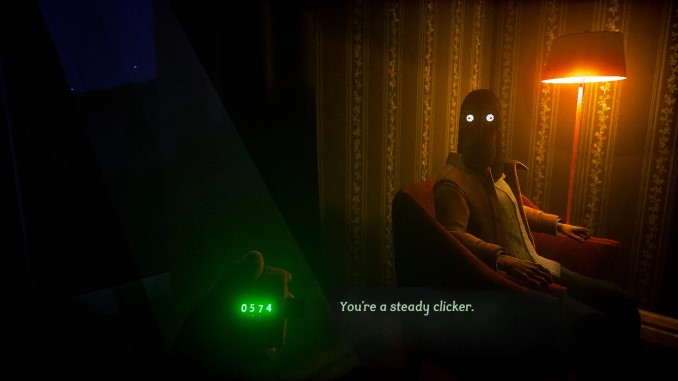
Platform: PC
Clickolding only takes about 40 minutes to finish, and consists mostly of pressing the spacebar. Despite that short time and limited action, though, it offers a lot to chew on, interrogating the power dynamics of videogames and the relationship between creator and player. Yes, it’s a clicker—perhaps the most mindless, repetitive, and cynical type of game—but one with a point. It flips the traditional power fantasies of games on their head while exploiting the pointlessness of the clicker. You’re not clicking for your own pleasure or the benefit of your character; you’re fulfilling somebody else’s fantasy—namely the masked pervert paying you to click a tally counter exactly 10000 times. It’s the guy’s dream, and there’s no doubt it’s sexual; he has that mix of anticipation and impatience that goes hand-in-hand with living out a fetish in real life, and gives directions to speed up or slow down, to change positions, to look at him or look away, as you click on. He talks about his double life, his secretive nighttime assignations, his wife and children at home oblivious to his kink, from behind an almost featureless brown mask, as you aimlessly click and walk around a small, cramped, dingy motel room. Most videogames flatter the player. We’re the chosen one, a super soldier, a pro athlete, a sociopathic criminal who never gets punished; we rescue the princess or win the war or beat up everybody else. Clickolding absolutely does not flatter anybody. It comments on games’ traditional relationship with the player by making it feel dirty and sordid. We’re helping somebody else live their fantasy—or, more accurately, their fetish—while they wear their home-made, Joe Camel-looking mask, with a gun occasionally pointed our way.—Garrett Martin
20. Tales of Kenzera: ZAU
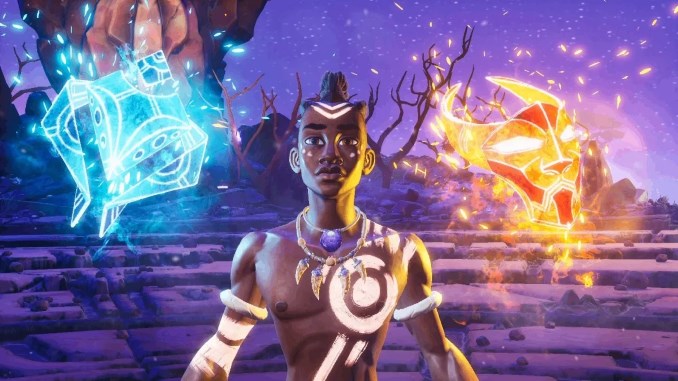
Platforms: PlayStation 5, Switch, Xbox Series X|S, PC
The beauty of Tales of Kenzera: ZAU is that grief is not linear. It’s not something you heal from and it doesn’t ever look the same across two people. It’s a deeply unique experience, but at the same time, it’s also universal. The complexity of grief is what makes it so. Zau feels anger, guilt, and sadness. He feels all of it and he mediates those emotions in the Great Spirits he helps cross over. He helps a parent loosen their grip on their child, he provides a salve to the anger between father and son, and he learns to let go. Each new character is a different expression of why you can get stuck in your loss, how it can debilitate you and keep you in an endless loop, ultimately impacting those around you. But even when the darkness rushes in at the end of boss battles as you try to escape a zone, the vibrancy of those emotions is never lost. When I pitched this article, I didn’t know if anyone would understand what I meant. The grief that Surgent Studios has captured is vibrant and saturated. It’s not a dull pang or a numbness that creeps. It’s more potent and the beautiful world it lives in makes it all the more impactful.—Kate Sánchez
19. Sorry, We’re Closed
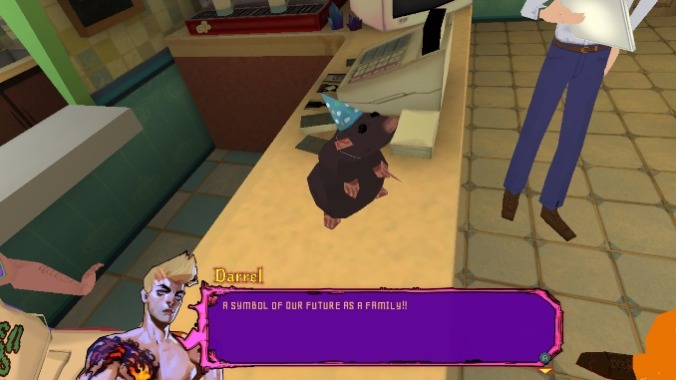
Platform: PC
Given that survival horror game Sorry, We’re Closed is centered around romance, you’d be forgiven for assuming it ends with your character hand-in-hand with a love interest against a passionate sunset. At least in my ending (one of four), that wasn’t the case. While that may sound anti-climactic, this journey is less about finding a new partner and more about reaching a headspace where this even feels like a possibility. Just like how powerful arch-demon the Duchess has to come to terms with being cast from heaven, the game’s main character Michelle must make peace with what happened and finally move on. It’s a central struggle brought to life through thoughtfully conveyed relationships and fixed camera angle gunslinging, making for a narrative that stands out in more ways than one (the stylish neon aesthetic and striking character portraits certainly help in that regard). Dating may be hell, but watching Michelle finally become ready to jump back into that inferno was worth the effort.—Elijah Gonzalez
18. Dungeons of Blood and Dream
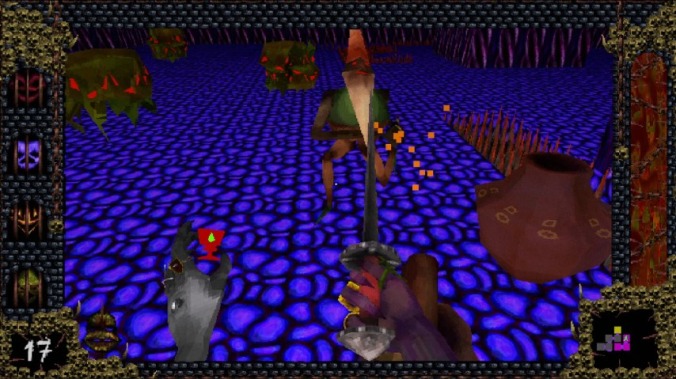
Platform: PC
What if magic had to mean it? In Dungeons of Blood and Dream, it’s physically painful to cast a spell. I don’t just mean in the numerical cost of hit points, I mean as each sigil gets locked in for a spell, the low-poly, intensely textured POV of my Blood Wizard convulses with the violent act of spellcraft. On your quest to overturn jealous and arcane gods, you’ll drink piss and mangle your fingers for power. It’s brutal and outlandish. Clever and inventive. It makes magic meaningful in all the ways that are interesting. It’s ugly and beautiful and chaotic, but it’s also one of the most intuitive and sensible set of dungeoneering systems I’ve ever had to discover myself (you will be given very little). If there was an award for Death Loop of the Year, Lori Vornoy would win it handily for this tripped-out vision of roguelike dungeon crawling at its pinnacle. Also the soundtrack slaps.—Dia Lacina
17. Shiren the Wanderer: The Mystery Dungeon of Serpentcoil Island
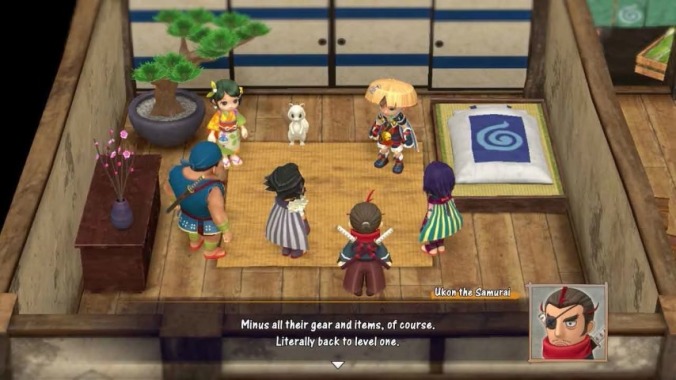
Platform: Switch, PC
The Mystery Dungeon of Serpentcoil Island is the first completely new Shiren title in 13 years, and it’s an incredible one. It’s the most refined and approachable Shiren to date. Dedicated series veterans might be able to get through the initial 31-floor dungeon with speed and relative ease, but for most players it will take time and experience to learn the ins and outs of the game, its items, its rules, and to build the muscle memory needed to see your way through the scenarios you’ll come across. You can send items back to the initial warehouse by way of a special pot or a merchant who makes that run—both instances being random—either putting an item you don’t need on this run in or attempting to salvage something vital from a doomed run before it ends. The game’s entirety is not revealed to you from the outset: you unlock new special items or features as you go by completing some optional story bits, which will be marked in the areas they’re occurring in with an exclamation point. For instance, if you want a magical staff that turns monsters into peach buns that you can then eat to turn into that monster yourself for the duration of a floor, you need to complete the quest with the Heavenly Maiden. Which will in turn also help you to unlock Asuka the swordswoman as a traveling companion in the dungeons—she really loves peach buns, and won’t be able to rest until she’s got access to a steady stream of them. There’s something for everyone in Serpentcoil Island. The main dungeon is just plain fun for series veterans even if it’s easier than some past Shirens, full of plenty of personality and character and its own little quirks and oddities to familiarize yourself with. And it still offers plenty of challenge for newcomers while also being welcoming and open to the idea of this being someone’s first true roguelike experience.—Marc Normandin
16. Dragon’s Dogma 2
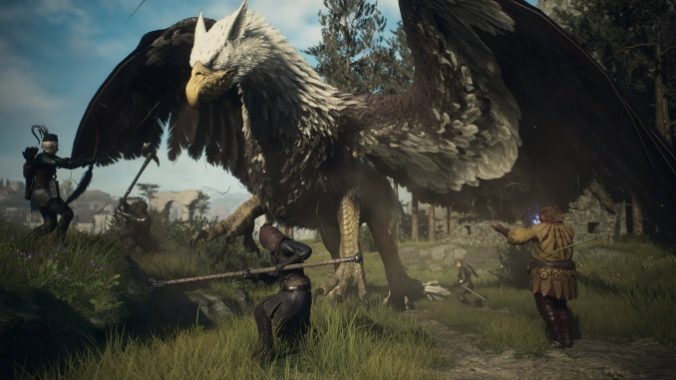
Platforms: PlayStation 5, Xbox Series X|S, PC
Although its story centers on a monarch trying to reclaim their crown and all the power that comes with it, Dragon’s Dogma 2’s greatest delights come from accepting you can’t control everything. You can’t influence inclement weather or the sun disappearing over the horizon as unsettling monstrosities burst from subterranean layers. You can’t blink across the world without paying for it, and instead, must take long journeys where the only cure for dwindling strength is rest. Sometimes, you can’t even get up a particular cliffside, its steep terrain forcing a different path. And most of all, you can’t always control who lives and dies (although there is a hilariously arcane process to resurrect the dead, for a price, of course). It’s not challenging in quite the same way as FromSoftware’s output, like Dark Souls and Sekiro, although I can see why those comparisons are made. Here, the toughness is less about learning to dodge-roll at the right time and more related to preparation and countering weaknesses. Dragon’s Dogma 2 also isn’t some entirely avant-garde, player-hating thing that rejects “fun” outright. It feels really good when you shield bash a guy, weaponizing the same inertia that’s sent you slipping down slopes to make a foe do the same. After hitting an off-balance enemy with a follow-up attack (aptly named “Empale”), the immaculate thud of the ensuing audio cue is music to my ears. It’s damn satisfying whenever things line up perfectly, like cutting a bridge out from under a charging Cyclops or sending a boulder ripping through an army of Saurians. But what makes these moments truly pop is that you don’t have fine control over when they arrive.—Elijah Gonzalez
15. Arco
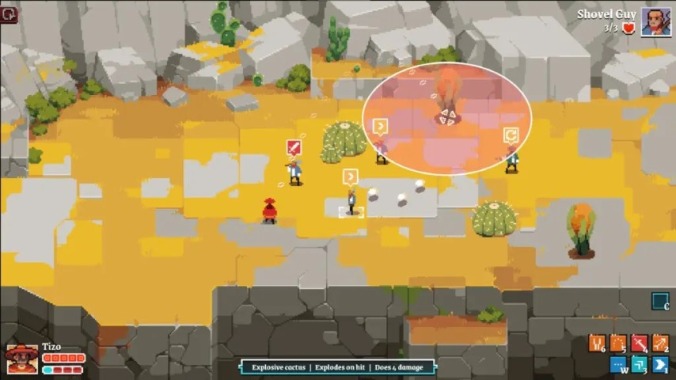
Platforms: PC, Switch
Turn-based strategy game Arco is a smart, sharply written, emotionally powerful game about a Mesoamerican civilization slowly being destroyed by colonialism, a pixelated revisionist Western in which the “newcomers” and the corporation they work for gleefully wipe out whole societies to maximize profits. The dialogue options are sparse but incisive and define characters quickly but clearly, and the vignette-style approach to the story gives a deeper and more expansive view of this culture and the war it’s destined to lose. And its battles are thrillingly unique for the genre; although you input orders for your characters one at a time, their actions are then carried out in real time, so you’ll have to predict your enemies’ tactics in advance. It’s more dynamic and challenging than the traditional Civilization or Final Fantasy Tactics biz, and its complexity and fluidity is always energizing. That all makes it one of the best games of 2024.—Garrett Martin
14. Mouthwashing
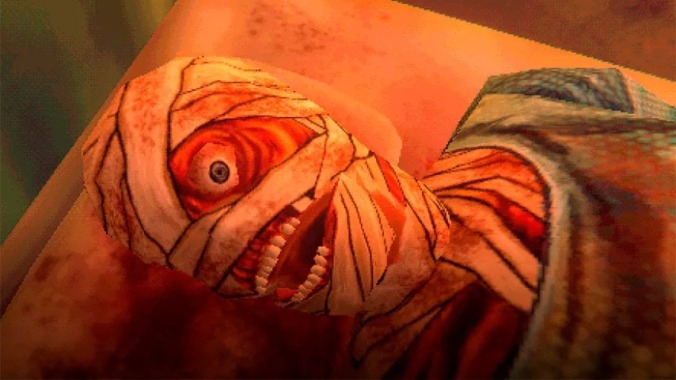
Platforms: PC
Mouthwashing is a bleak first-person psychological horror game developed by Wrong Organ, who genre-heads may know from their surreal freeware title How Fish is Made. While their latest starts out in a somewhat more grounded place (in that you don’t play as a sardine engaging in faux-philosophical discussions), it gradually builds towards similarly hallucinatory turns that make this a brain-searing lo-fi horror experience. After your captain crashes the Tulpar, a cargo spaceship, in a botched suicide attempt, the rest of the crew grapples with being stranded in deep space. Spoilers, they don’t handle it particularly well. If it wasn’t clear from this setup, this one is downright oppressive; your vessel is a dreary, increasingly dilapidated tomb portrayed via low-poly visuals which, like many games in this style, invite us to imagine the finer details for ourselves. These dimly lit corridors draw us in, less building towards jump scares or frightening encounters with monsters, and more inching us further into these characters’ headspaces as they approach heavily foreshadowed carnage. As you explore this ship, solving simple puzzles, the narrative uncomfortably peels back the layers of its crew like a Charlie Kaufman film, prodding at fears of purposelessness and employment anxieties as it builds towards its nightmarish climax that unveils the unforgivable act at the heart of this story. Through its portrayal of desperation, avoidance of responsibility, and crushing guilt, Mouthwashing is as cold as the vacuum of space. —Elijah Gonzalez
13. Prince of Persia: The Lost Crown
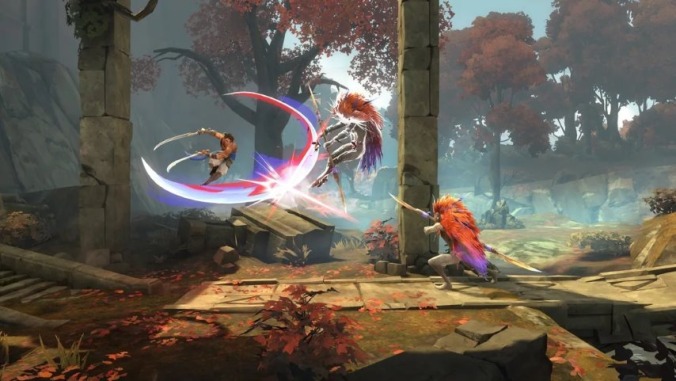
Platforms: PC, Xbox Series X|S, Switch, PlayStation 5, Xbox One, PlayStation 4
From the first rotoscoped jogs and leaps of Jordan Mechner’s brother, the core of Prince of Persia has been one of the exaltation of movement. We’ve come a long way since young David’s parking lot antics. Returning to its two-dimensional origins, The Lost Crown carries forward the dedication to cruel traps, brisk combat, and fluid motion into a stunningly-realized, interconnected world of elaborate puzzles and shortcuts, and it does it all with a rush of speed the franchise has rarely known. With how truly outstanding this game is, I’d be remiss in not mentioning how astonishingly idiotic the powers-that-be at Ubisoft were for dissolving and reassigning this team to work on old, crusty IP that posts big numbers for shareholders instead of giving them every opportunity to succeed a second time.—Dia Lacina
12. Astro Bot
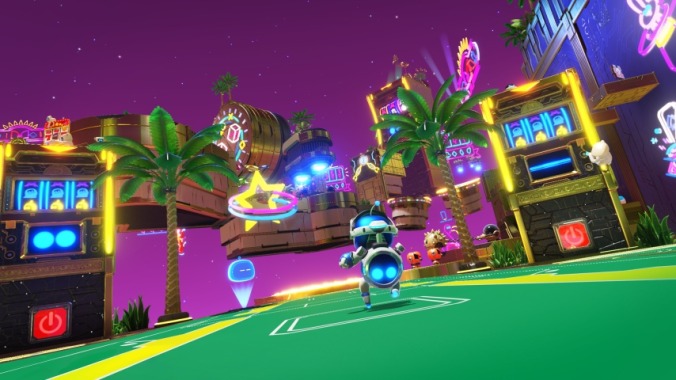
Platform: PlayStation 5
Astro Bot is proof that, when it comes to games, bigger doesn’t always mean better. Sure, this beefed up sequel to Astro’s Playroom is longer and far more popular than that game, but it comes at a cost; while Playroom was laser-focused on plumbing the capabilities of the brand new PlayStation 5, while paying a respectable amount of tribute to the platform’s history, Astro Bot is a little overstuffed with underexplored ideas and mechanics and weighed down by constant nostalgia and references. That’s not to say it’s a bad game; it wouldn’t be here if it was. Astro Bot is an ingenious and eminently playable romp whose restless creativity is admirable and infectious despite its lack of focus. If this was Astro’s non-VR debut instead of Playroom, it would have been a massive revelation. As it is, it’s a really good game that lacks the elegance of its predecessor. It’s still easily one of the best games of 2024, though, and a must-play for Sony heads or platformer fans.—Garrett Martin
11. Tekken 8
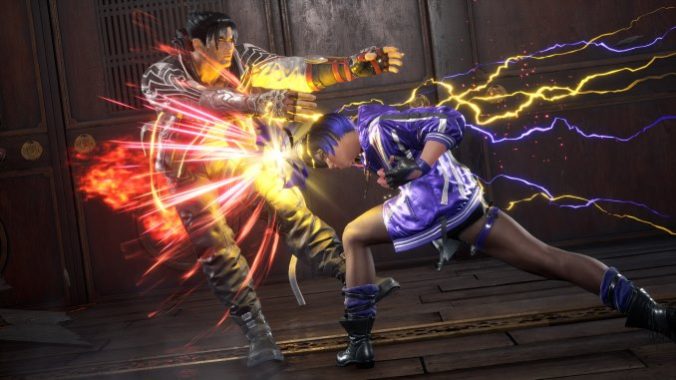
Platforms: PlayStation 5, Xbox Series X|S, PC
Tekken 8 may not be a sea-change sequel, but it hones what came before, reducing pain points for newcomers without reducing the complexity that makes this series special. Although the dust needs to settle to determine if its Heat system’s boons outweigh its shortcomings, the massive character movesets, rewarding roster, and explosive combos ensure its battles are exciting and tactically deep. Improved teaching tools, like its Arcade Quest mode and training room adjustments, make it easier to experience these highs. Additionally, its revamped look and hard-hitting aesthetics elevate not only its matches but also its story, a high-octane anime-inspired romp that ties together three decades of history into a resounding haymaker. If you’ve ever wanted to learn how to beat a buddy mashing cheap moves in your dorm, been curious about what’s going on under the hood as Arslan Ash and Knee duked it out in impossibly hype EVO sets, or wondered why these buff dudes keep throwing each other off cliffs, there’s never been a better time to dive into the strange and wonderful world of Tekken and find out for yourself.—Elijah Gonzalez
10. Llamasoft: The Jeff Minter Story
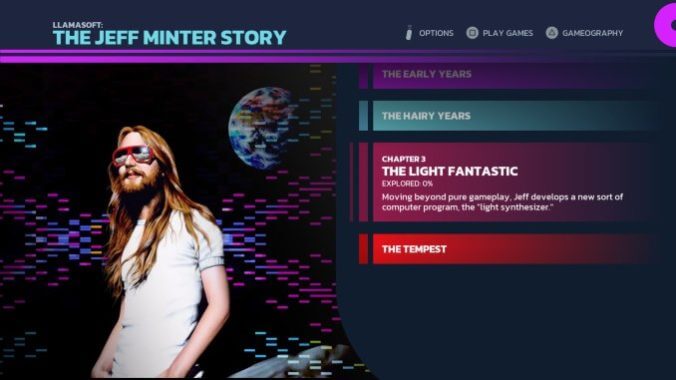
Platforms: Switch, PlayStation 5, Xbox Series X|S, PC, Xbox One, PlayStation 4
Just as earlier Gold Series entry The Making of Karateka and its precursor Atari 50 gave us an in-depth look at the background and creation of the games they focused on, Llamasoft is full of videos and archival footage about game designer Jeff Minter’s decades-long history and how his games were created, marketed, and received by the press and the public. Minter himself is beguiling, a shamanistic figure who indulges his love of computer games, psych and prog rock, and hoofed mammals in semi-seclusion in Wales, and who has been an outspoken proponent of independent game design for most of his career. The latest entry in Digital Eclipse’s series of playable documentaries collects dozens of Minter’s early games, from his earliest ZX81 rough drafts up to his 1994 masterpiece Tempest 2000, and the hallmarks of a true artist are unmistakable. Throughout his career Minter has continually iterated on similar themes, mechanics, and images, creating a unified body of games whose dreamlike logic and visuals are at odds with their strict difficulty and well-defined mechanics. Minter’s work exists in the contrast between form and function; he’s a visual iconoclast resolutely exploring the most traditional notions of “gameplay” through surreal arcade games that always bear his personal signature. His games look like abstract art and play like something you could’ve found in a bowling alley arcade in 1985, and that’s about the most bulletproof approach to game design I can think of. For over 40 years Minter has made some of the greatest, most inventive games ever, and this brilliant collection is one of the best games of 2024.—Garrett Martin
9. Animal Well
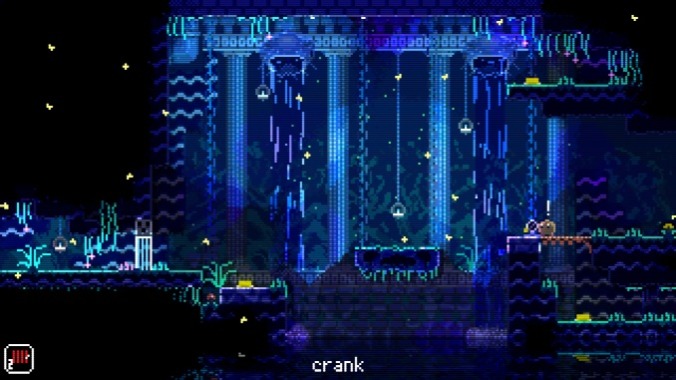
Platforms: PlayStation 5, Switch, Xbox Series X|S, PC
You’ve probably seen many of Animal Well’s components in isolation before. Its structure is at least partially inspired by games like Metroid, its style of puzzles bear a lot of resemblance to Fez, and its retro aesthetics call to mind a whole host of older games and contemporary works. But the way these parts come together is nothing short of uniquely enrapturing. Its smaller puzzles are rewarding, and its larger ones are so satisfying that things can quickly spiral into outright obsession, something made more captivating by this well-realized setting that is charming and disquieting in equal measure. At its core, Animal Well profoundly understands how to encourage and pay off curiosity, which is probably why, even after digging into and solving many of its mysteries, I still need to know just how much deeper this rabbit hole goes.—Elijah Gonzalez
8. Lorelei and the Laser Eyes
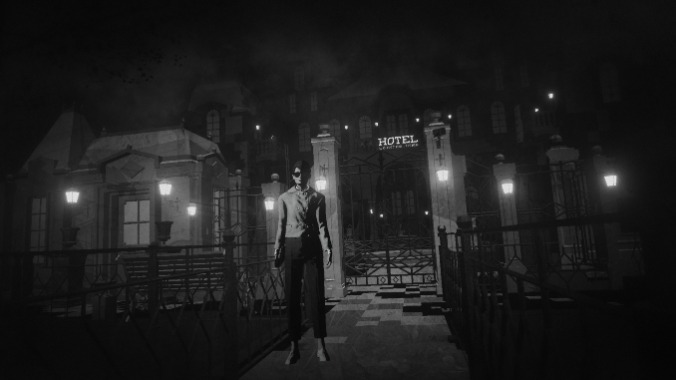
Platforms: Switch, PlayStation 5, PC
Lorelei and the Laser Eyes is a game with vision. It wraps intriguing puzzles in a digital gothic framework. It makes the most of its chosen medium as it forces us to navigate the tenuous details of this backdrop. Just about every layer of the experience is creatively risky, from its fragmented narrative to its uncompromising barrage of challenges, but these gambles largely pay off to deliver something with purpose and direction. Crafting this kind of maze isn’t easy; it takes a combination of subtle guidance and faith in your audience. But despite these challenges, Simogo never loses sight of how to stoke curiosity about what’s lurking around the next corner, whether it’s a treasure you’ve been seeking or, conversely, something horrible lurking in the dark.—Elijah Gonzalez
7. Arctic Eggs
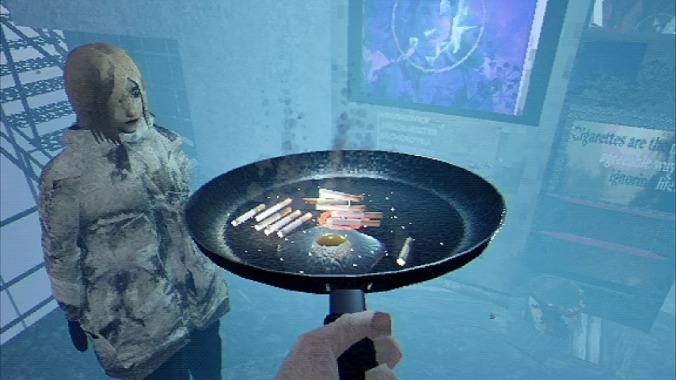
Platforms: PC
I love eggs and I love cigarettes. No, you don’t understand. I really love eggs and cigarettes. I also love feeding people. I want to feed you at the end of the world. At the end of the world, I want to feed you all eggs, and maybe cigarettes, maybe ammunition, or eggs and canned fish and bacon. Do you have a favorite incongruous combination of absurd physics objects you want me to perfectly time in my sizzling skillet? Let’s fucking go. We’re on Big Shell, we’re on a khrushchyovka, we’re on the combination Big Shell khrushchyovka far beyond the timberline. Let me cook weird egg-centric meals for you while you tell me your weirdest thoughts.—Dia Lacina
6. Ultros
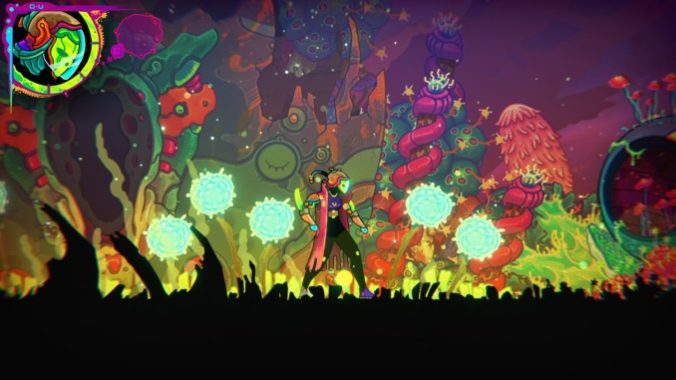
Platforms: PlayStation 4, PlayStation 5, PC
Playing Ultros is gaming in a cloud of color and confusion, a perpetually exciting state of being that evokes the earliest days of videogames while still feeling ahead of its time. Between your constantly shifting relationship with your surroundings, the cryptic goals and hallucinatory interactions, the structure and action of Ultros is as psychedelic as its music and art. And that’s genuinely shocking, as few games are as fiercely devoted to the psychedelic aesthetic as this one. The bright, brilliant artwork by El Huervo channels the twisty chaos of comics legend Brendan McCarthy (who might be better known today as the co-writer and designer of Mad Max: Fury Road), uniting the abstract and the visceral (literally—guts are an omnipresent symbol throughout Ultros) to create an art style unlike any other in games. Meanwhile Ratvader’s original score captures the yawning, dramatic stillness of Popol Vuh, the ambient German rock group who soundtracked several Herzog films. El Huervo’s art and Ratvader’s music are the most obvious psychedelic signifiers in Ultros, but the game itself lives up to their mind-altering ambitions. It’s one of the best games of 2024.—Garrett Martin
5. Thank Goodness You’re Here!

Platforms: PC, Switch, PlayStation 5, PlayStation 4
Thank Goodness You’re Here, a surreal puzzle-platformer where comedy takes precedence over everything else, is a game like none other. Imagine if peak Monty Python somehow made an Adult Swim show in the 2000s, except it was a game and not a show, and featured Matt Berry giving another impeccable Matt Berry performance. The “puzzles” are less about challenging you and more just a framework for bizarre little comedy sketches, pretty much all of which are absolutely hilarious. And it smartly ends well before it starts to wear out its welcome, after only two or three hours. It’s basically a perfect game if you share its sense of humor, and if you don’t share its sense of humor, you’re probably a bit of a bore. (Sorry.) It’s one of the most purely enjoyable games I’ve ever played, and I’m thinking it will be as fun to revisit again and again as the great comedies it echoes; it’s absolutely one of the best games of 2024.—Garrett Martin
4. Metaphor: ReFantazio
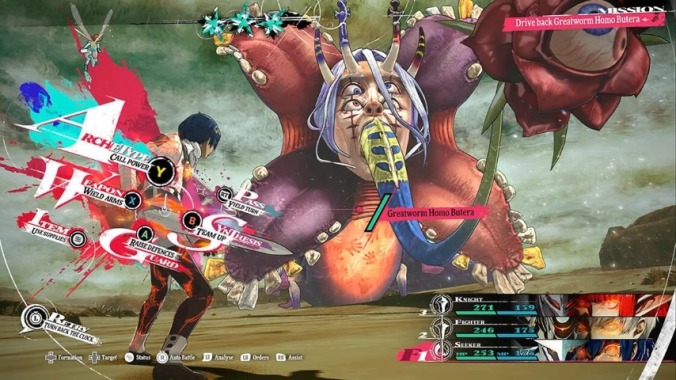
Platforms: PlayStation 5, Xbox Series X\S, PC, PlayStation 4
Metaphor: ReFantazio is a great RPG, and an excellent wake up call. The message within it doesn’t feel tacked on. The developers aren’t giving themselves a pat on the back with a not so subtle wish for the story they crafted to be the fantasy that inspires the player without the required foundation. Different structural framings (“use your time wisely and strive to be the best version of yourself”) make a difference. When some people still consider games like Final Fantasy VII to be apolitical in 2024, perhaps the bluntness is justified.
As Metaphor: ReFantazio constantly reminds us, both micro and macro problems are intertwined. What’s the perspective of somebody looking for an abortion in a red state, a family separated by the border, a kid in Gaza? The examples are everywhere, and they’re visibly blunt, too. They’re there while we scroll down on the timeline or in three-second-long attention span cycles while we swipe reels. If only more people made the effort to see things through somebody else’s eyes, perhaps we could regain some semblance of hope that change might stop being a fantasy.—Diego Nicolás Argüello
3. Balatro
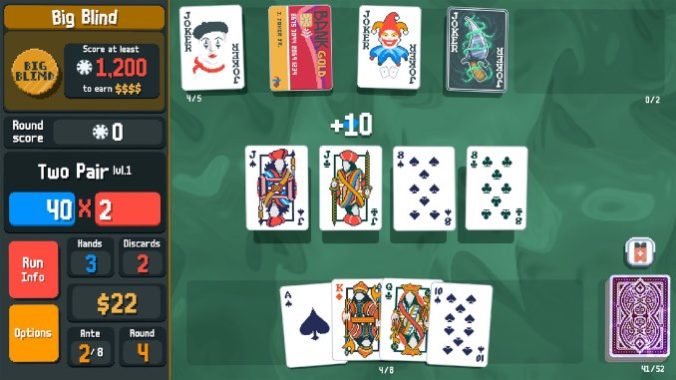
Platforms: PC, Xbox Series X|S, Switch, PlayStation 5, Xbox One, PlayStation 4, iOS, Android
As someone who would rather play virtually any board game than a hand of poker, I was pleasantly surprised by Balatro, a roguelike deckbuilder that transforms this card game into something else entirely. Some elements are what you’d expect; you begin with a standard 52-card deck and score by putting together traditional poker hands like pairs, flushes, and straights. However, where things get interesting is that over the course of a run, you can augment your deck by replacing certain cards with others, upgrading them, collecting passive upgrades that amplify your score, and more. Instead of playing against opponents like in Texas Hold ‘Em, your goal is to build hands that score enough chips to get you through an increasingly expensive series of antes. Like any successful deckbuilding game, decision-making matters in both assembling your deck and playing it. Instead of just going by traditional poker hand strength, points are calculated by multiplying the base amount of chips your hand is worth (chip count corresponds to the card rank, i.e., 9, 10, J, Q, etc.), with the particular multiplier associated with that hand (for instance, a two pair has a x2 multiplier while a three of a kind has a x3 multiplier). Where things get busted is that you can upgrade the multipliers associated with specific hands or cards, and passive abilities add to your multiplier, which can eventually dramatically boost the number of chips you earn. You can gear your deck around certain hands, suits, or passive abilities to increase the odds of hitting big. Outside of the deckbuilding, you’re given a wide array of options and information that makes it feel tactically deep. The game counts cards to let you know the odds, has the option to discard and redraw, allows you to change the order that passive abilities activate, and has consumable items. Good deckbuilders feel fair and like they offer meaningful decisions while constructing and playing your deck. Balatro does all that while also letting you blast apart the rules of poker.—Elijah Gonzalez
2. 1000xRESIST
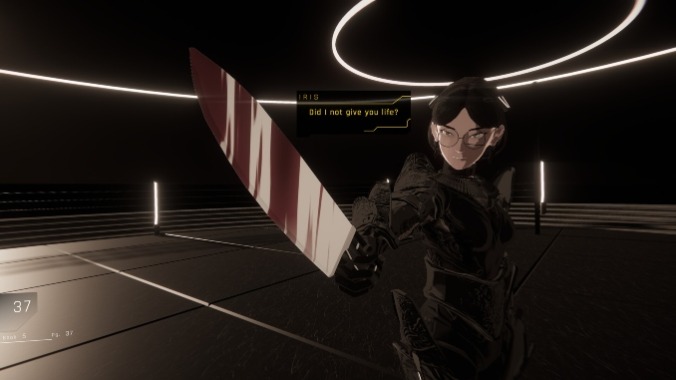
Platforms: Switch, PC
1000xRESIST is many things, but it’s not a game that holds back any gut punches. It refuses to fit into any one box. It’s a walking simulator for a few hours before switching to a side-scroller. The third-person perspective suddenly shifts to a top-down view. It’s a visual novel but also you’re lunging between different nodes on a wide map. It’s a time puzzler and, at times, survival horror. It’s wholeheartedly committed to furiously surprising you again and again and again, and it undoubtedly excels in this mission from beginning to end. It’s the kind of game that can leave you feeling transformed. Few are the games as bold and brave and brilliant as this one; throughout its 15 hours, there’s a palpable eagerness to take the risks that many other teams would shy away from, especially considering this is Sunset Visitor’s debut game. 1000xRESIST is a dazzling testament to the stories this medium has yet to tell; an exemplification of the best that small yet ambitious teams can create; and a gateway to a future in which more videogame narratives have the courage and soul to tackle the ideas that it executes with equal precision and grace. It’s simply triumphant in everything it sets out to do.—Natalie Flores
1. UFO 50
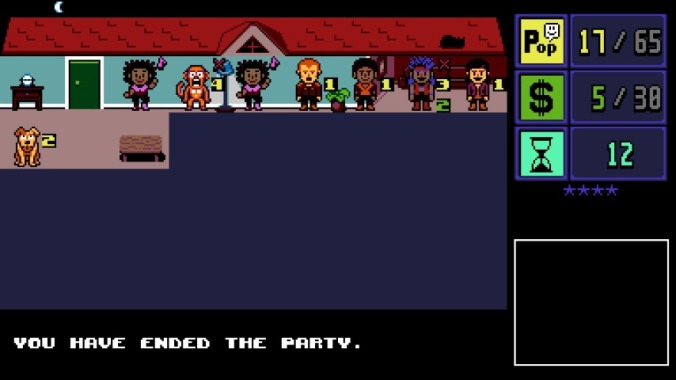
Platform: PC
If the concepts for the 50 games in the fictional ’80s compilation UFO 50 sound inspired, well, that’s one of the things that makes it so great—probably too great to be a genuinely realistic fake ‘80s collection. There’s no laziness here, no hack jobs or quick cash-ins; every game has a cool or quirky angle to it, both narratively and mechanically, that puts them more in line with the kind of smart, retro-style independent games from the 2000s and 2010s that UFO 50’s designers are known for than the often limited and uninspired fare that even the best studios cranked out in the ‘80s. It took Mossmouth almost a decade to make UFO 50, which was originally aiming for a 2018 release; that roughly matches the amount of fictional time covered by the game, but I can’t think of any real studio or group of designers in the ‘80s who created a body of work as varied, thoughtful, substantial, and consistently interesting as UFO 50. Designer Derek Yu and crew don’t just evoke the most seminal decade for videogames here; they one-up it at almost every turn. It’s not just one of the best games of 2024; it’s 50 of ’em.—Garrett Martin
Follow Paste Games on BlueSky.